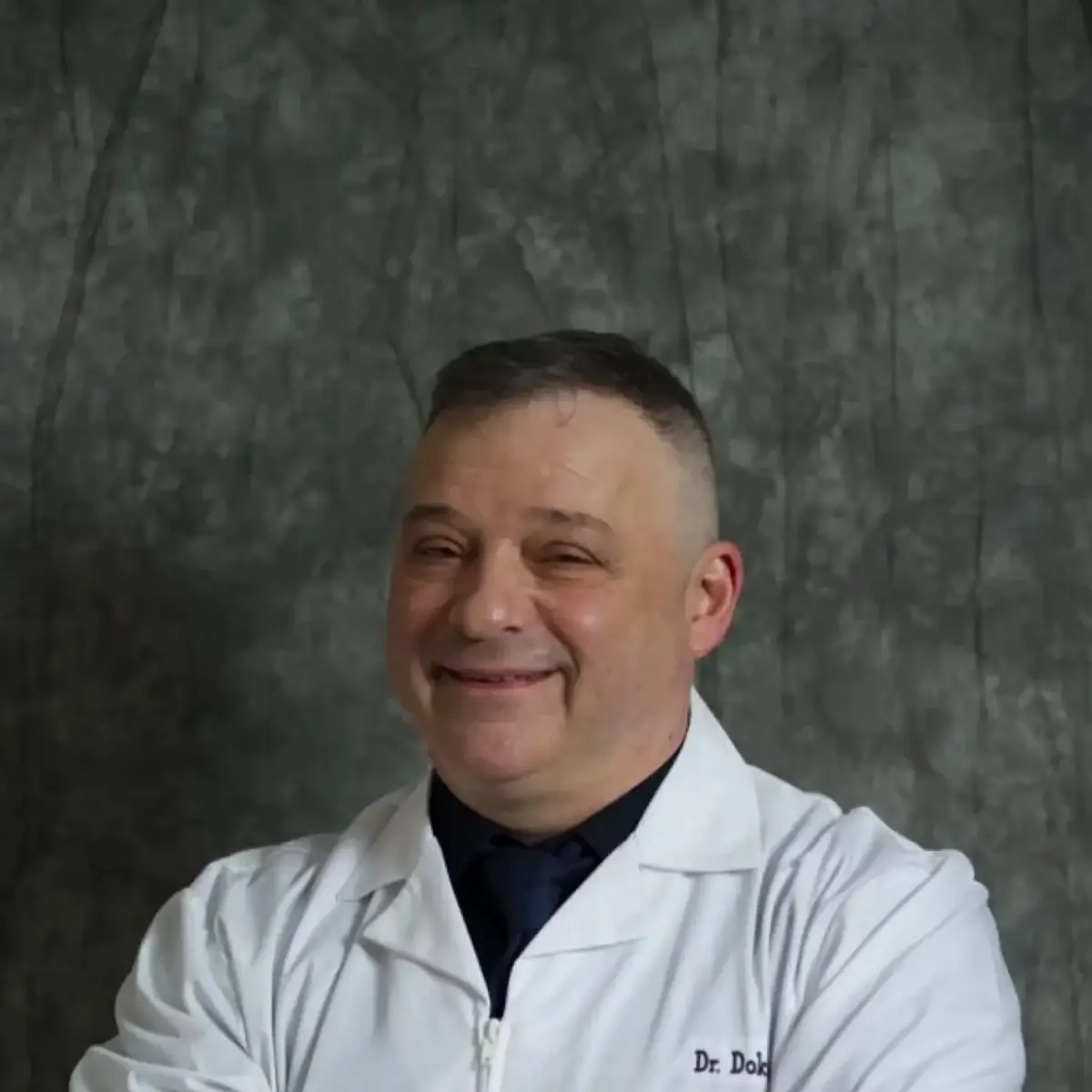Ceramic crowns
What Are Partial Dentures?

Dentures are custom-made appliances that replace missing teeth and the surrounding tissues. They consist of artificial teeth attached to a gum-colored base, which rests on the gums or is supported by the remaining teeth. Dentures can be complete, replacing all teeth in the upper or lower arch, or partial, replacing some missing teeth while leaving natural teeth intact. Dentures have long been a reliable solution for replacing missing teeth and restoring oral function and aesthetics.
When some natural teeth are missing, partial dentures offer a practical and cost-effective option to fill the gaps and improve a patient’s smile. Partial dentures are removable dental prostheses designed to replace multiple missing teeth while preserving the remaining natural teeth. They provide patients with the ability to eat, speak, and smile confidently.
Advantages
Benefits Of Partial Dentures

Partial dentures offer several benefits that make them a popular choice for replacing missing teeth:
Improved Chewing and Speech
By replacing missing teeth, partial dentures restore proper chewing function, allowing patients to enjoy a wide variety of foods. They also help in improving speech clarity, especially when missing front teeth affect speech patterns.
Restored Aesthetics
Partial dentures are carefully designed to blend seamlessly with the natural teeth, enhancing the appearance of the smile. They fill in the gaps left by missing teeth, creating a more complete and aesthetically pleasing smile.
Preservation of Remaining Teeth
Partial dentures provide support to the remaining natural teeth by preventing them from shifting or drifting into the empty spaces. This helps maintain the alignment and stability of the bite.
Affordable Option
Compared to other restorative options like dental implants or dental bridges, partial dentures are a more cost-effective solution for replacing multiple missing teeth.
Non-Invasive Procedure
The fabrication and placement of partial dentures do not require any surgical procedures, making them a non-invasive option for restoring missing teeth.
DR. DOKTORMAN IS A PARTICIPATING PROVIDER OF ALL MAJOR INSURANCES SUCH AS METLIFE, DELTA, AETNA, AND CIGNA, etc.
It’s virtually impossible to list all of them on this page. If you have any questions regarding your dental coverage, we will be happy to answer them.
Types
Types Of Partial Dentures
There are different types of partial dentures available, each offering unique features and benefits. The three primary types of partial dentures are:
Removable partial dentures are one of the most common types of partial dentures. They consist of artificial teeth attached to a gum-colored acrylic base, which is supported by a metal or acrylic framework. Removable partial dentures are designed to replace missing teeth while being easily removable for cleaning and maintenance.
Removable Partial Dentures
Fixed partial dentures, commonly known as dental bridges, are non-removable prosthetic devices used to replace missing teeth. Unlike removable dentures, dental bridges are permanently fixed in place, providing a stable and natural-looking restoration.
Fixed Partial Dentures (Dental Bridges)
Flexible partial dentures are an innovative alternative to traditional rigid denture materials. They are made from a thermoplastic nylon material that provides flexibility, comfort, and aesthetics. The flexibility of the material allows for a snug and precise fit, adapting well to the contours of the mouth.
Flexible Partial Dentures
Choosing the right type depends on your preferences and budget, so a consultation with a professional dentist is crucial.

Removable Partial Dentures
Removable partial dentures are one of the most common types of partial dentures. They consist of artificial teeth attached to a gum-colored acrylic base, which is supported by a metal or acrylic framework. Removable partial dentures are designed to replace missing teeth while being easily removable for cleaning and maintenance.

Fixed Partial Dentures (Dental Bridges)
Fixed partial dentures, commonly known as dental bridges, are non-removable prosthetic devices used to replace missing teeth. Unlike removable dentures, dental bridges are permanently fixed in place, providing a stable and natural-looking restoration.

Flexible Partial Dentures
Flexible partial dentures are an innovative alternative to traditional rigid denture materials. They are made from a thermoplastic nylon material that provides flexibility, comfort, and aesthetics. The flexibility of the material allows for a snug and precise fit, adapting well to the contours of the mouth.
What you need
How do I Know if i Need Partial Dentures?

Partial dentures are an effective solution for various dental conditions, providing patients with functional and aesthetic benefits. They are specifically indicated for the replacement of missing teeth, restoring chewing function, and improving speech and appearance. Understanding these indications can help patients and dentists determine whether partial dentures are the right treatment option for their specific needs.
Replacement Of Missing Teeth
The primary indication for partial dentures is to replace missing teeth. When one or more teeth are lost, a partial denture can fill in the gaps and restore a complete smile. Partial dentures are custom-made to match the natural teeth in shape, size, and color, creating a seamless and natural-looking appearance. By replacing missing teeth, partial dentures help maintain the proper alignment of the remaining natural teeth, preventing them from shifting or drifting into the empty spaces.
Restoring Chewing Function
Missing teeth can significantly impact a person’s ability to chew and properly process food. This can lead to difficulties in eating a balanced diet and potentially compromise overall health. Partial dentures play a vital role in restoring chewing function by replacing missing teeth with artificial teeth that are designed to bite and chew like natural teeth. With partial dentures, patients can enjoy a wider range of foods, improving their nutrition and overall well-being.
Improving Speech And Appearance
Missing teeth can affect speech patterns and lead to difficulties in pronouncing certain sounds. By filling in the gaps, partial dentures can help improve speech clarity and articulation. They provide support to the lips and cheeks, restoring the natural shape and fullness of the face, which can have a positive impact on overall appearance and self-confidence.
In addition to speech and appearance, partial dentures also help in maintaining proper oral and facial muscle tone, preventing sagging of the facial tissues that can occur with missing teeth.
It’s important to note that partial dentures are not only for elderly individuals. They can be recommended for patients of various age groups who have lost teeth due to factors such as trauma, decay, or periodontal disease.
We evaluate each patient’s specific dental condition, overall oral health, and individual preferences to determine the most suitable treatment plan. In some cases, alternative options like dental implants or fixed dental bridges may be considered. However, partial dentures are often a viable and cost-effective solution for patients who may not be suitable candidates for other treatments.
What you need
Evaluation And Preparation For Partial Dentures
The evaluation and preparation phase are a crucial step in the process of getting partial dentures. It involves a comprehensive oral examination and assessment, dental impressions, and measurements, and preparing the mouth for the successful placement of partial dentures. This stage ensures that the dentures fit accurately, provide optimal function, and deliver a natural and comfortable restoration.
Oral Examination And Assessment
The first step in the evaluation process is a thorough oral examination and assessment. We will examine the overall oral health, including the condition of the remaining natural teeth, the health of the gums and underlying bone, and the general oral tissues. Any existing dental issues such as decay, gum disease, or oral infections will be addressed before proceeding with the placement of partial dentures.
Furthermore, our team will evaluate the stability and suitability of the remaining natural teeth as anchors for the partial dentures. The bite and occlusion will also be assessed to ensure proper alignment and functionality of the dentures.
Dental Impressions And Measurements
Accurate dental impressions and measurements are vital to creating well-fitting and comfortable partial dentures. During this step, we will take impressions of the teeth and surrounding oral tissues using a dental putty or digital scanning technology. These impressions capture the exact shape and contours of the mouth, allowing for the fabrication of custom-made partial dentures.
In addition to impressions, we take detailed measurements of the oral structures, including the height and width of the arch, the spacing between teeth, and the bite relationship. These measurements are crucial in ensuring that the partial dentures are precisely tailored to fit the patient’s unique oral anatomy.
Preparing The Mouth For Partial Dentures
To ensure the proper fit and function of partial dentures, it may be necessary to prepare the mouth before their placement. This preparation involves several steps:
a. Tooth Preparation: If there are any decayed or damaged teeth in the edentulous (toothless) area, they may need to be extracted or treated prior to the placement of the partial dentures. This ensures a healthy foundation for the dentures and prevents any underlying dental issues from affecting the long-term success of the restoration.
b. Reshaping and Smoothing: Our dentist may perform minor reshaping or smoothing of the remaining natural teeth. This process, known as tooth contouring, creates space and enhances the fit of the partial dentures.
c. Tissue Conditioning: In some cases, we may recommend tissue conditioning, which involves wearing a temporary denture or a soft liner to reshape and condition the oral tissues before the final placement of the partial dentures. This step helps ensure a comfortable fit and proper adaptation of the dentures to the gums.
d. Bite Alignment: We also evaluate the bite relationship between the upper and lower jaws. If necessary, adjustments may be made to achieve proper occlusion and ensure a balanced bite with the new partial dentures.
By meticulously evaluating, measuring, and preparing the mouth, we can ensure that the partial dentures are custom-made to provide a precise fit, optimal functionality, and natural aesthetics. This comprehensive approach helps to minimize discomfort, ensure long-term comfort, and enhance patient satisfaction with their new partial dentures.
Contraindications
Contraindications to Partial Dentures
Indications
- Multiple Missing Teeth
- Healthy Remaining Teeth
- Desire for a Removable Option
- Need for Cost-Effective Solution
- Quick Replacement


Сontraindications
- Poor Oral Hygiene
- Insufficient Supporting Teeth
- Severe Gum Disease or Tooth Decay
- Allergies to Denture Materials
- Unwilling to Adapt to Removable Dentures
What you need
Care And Maintenance Of Partial Dentures
Proper care and maintenance of partial dentures are essential to ensure their longevity, functionality, and hygiene. By following recommended cleaning practices, handling the dentures with care, storing them properly, and scheduling regular dental check-ups, patients can keep their partial dentures in optimal condition and maintain good oral health.
Cleaning And Hygiene Practices
Daily cleaning is crucial to remove plaque, food particles, and bacteria from partial dentures. Here are some cleaning practices to follow:
a. Rinse after meals: After eating, remove the dentures and rinse them thoroughly under running water. This helps remove loose debris and prevent the buildup of bacteria.
b. Brushing: Use a soft-bristle toothbrush or a denture brush specifically designed for cleaning dentures. Gently brush all surfaces of the dentures, including the artificial teeth, gum-colored base, and clasps. Use a mild denture cleaner or non-abrasive toothpaste to clean the dentures. Avoid using regular toothpaste, as it may be too abrasive and damage the denture material.
c. Soaking: Consider soaking the dentures in a denture cleaning solution or a mixture of mild dish soap and water. Follow the manufacturer’s instructions or consult us for appropriate soaking duration. This helps to eliminate bacteria and remove stains.
d. Oral hygiene for natural teeth: If you have natural teeth remaining, it’s important to maintain good oral hygiene by brushing them twice a day and flossing daily. Keeping the remaining teeth clean and healthy supports the overall oral health and enhances the longevity of the partial dentures.
Proper Denture Handling And Storage
Proper handling and storage of partial dentures contribute to their durability and hygiene. Here are some important practices to follow:
a. Handle with care: When handling the dentures, stand over a soft towel or a basin filled with water to prevent damage if they accidentally slip from your hands. Avoid using excessive force or bending the clasps when inserting or removing the dentures.
b. Avoid hot water: Do not expose the dentures to hot water, as it can cause warping or distortion of the denture material. Use lukewarm water for cleaning and soaking.
c. Never sleep with dentures: It is important to remove and clean the dentures before going to bed. Giving your mouth and gums a rest from wearing dentures overnight helps to promote oral health and prevent potential complications.
d. Denture adhesive: If recommended, use denture adhesive sparingly and as directed. Applying a small amount of adhesive can improve denture stability and retention.
Regular Dental Check-Ups
Regular dental check-ups are crucial for the overall maintenance of oral health and the longevity of partial dentures. Here’s why:
a. Professional cleaning: Dental professionals can clean and polish your partial dentures more effectively than home care alone. Regular professional cleanings help remove stubborn stains, plaque, and tartar buildup, ensuring the dentures remain clean and hygienic.
b. Oral health assessment: During dental check-ups, we will examine your oral tissues, including the gums, remaining natural teeth, and the fit of the partial dentures. Any necessary adjustments or repairs can be made to ensure optimal comfort and function.
c. Oral cancer screening: Regular dental check-ups provide an opportunity for oral cancer screening. Also we can identify any suspicious lesions or signs of oral cancer, facilitating early detection and treatment.
d. Denture evaluation: Over time, the fit of partial dentures may change due to natural jawbone resorption or other factors. Regular dental check-ups allow us to assess the fit and functionality of the dentures and make any necessary adjustments or replacements.
Whether you need removable partial dentures, fixed dental bridges, or flexible partial dentures, we have the expertise and resources to meet your specific needs and guide you through the evaluation, preparation, and fitting process to ensure that your partial dentures, including implant denture options, are tailored to your unique oral anatomy.
Together, with your trusted dentist in Clifton, we will develop a personalized treatment plan to meet your unique needs and provide you with a beautiful and functional smile. Trust us to deliver exceptional results with our top-of-the-line partial dentures. Visit Dr. Edward Doktorman in Clifton, NJ, and experience the difference of our expertise, advanced technology, and compassionate care.
Find Out If Implantation
Is Right for You
Contact us to book
your appointment with our dentist!
Before\After
Before

After

Why us
Why choose
Dr. Edward practiсe?

Dr.Doktorman offers full range of services in the scope of general dentistry,such as cosmetic composite fillings,root canals,removable dentures of multiple designs,crown and bridges,surgical services and gum treatment.
Dr.Doktorman completed implant residency in NYU.All phases of implant dentistry are performed in our office.We offer implant placement,variety of implant supported restorations both fixed and removable. Our office offers a FREE consultation for the patients interested in implant placement and restorations.
Testimonials
What our clients say
I’ve been a regular patient of Dr. Doctorman for over a decade, and I can confidently say he’s an exceptional dentist. His expertise and attention to detail have resolved all my dental issues, and his commitment to thorough, personalized care is unmatched. I consistently receive top-notch treatment during my regular checkups, and his friendly demeanor makes each visit pleasant. Dr. Doctorman is the ultimate professional in his field, and I highly recommend him to anyone seeking reliable and effective dental care.
Dr. Doktorman and his team are a top-notch group for all your dental needs! I have been going to Dr. Doktorman for over 10 years and know that I am in the best hands whether it’s for my routine check-ups or consultations. Dr. Doktorman is very knowledgeable, friendly, and answers all of your questions thoroughly. If you are looking for a top-notch dentist for yourself or loved ones, I highly recommend Dr. Doktorman!
I have been a patient of Dr. Doktorman at Prestige Dental for over 9 years. In addition to being a skilled, caring professional, Dr. Doktorman is a very personable and immediately puts patients at ease. He makes sure the patient understands their treatment plan, explaining it in an easy-to-understand manner. The office staff is also top notch. They are friendly and helpful at all times. Dr. Doktorman has responded to me after hours and on weekends when I called about emergent dental issues. I have lived in two different states and had several dentists throughout my life. Dr. Doktorman through his practice Prestige Dental is the finest dental provider I have found. I highly recommend Prestige Dental for all your dental needs.
I have been a patient of Doktorman for 20 years, and I can confidently say that he is the epitome of professionalism in dentistry. Throughout my career in the fashion and modeling industry, I have been privileged to work with some of the best doctors, and Doktorman meets the highest standards of excellence.Every procedure I’ve undergone has been executed with utmost precision and care. Edward is always available and goes above and beyond to accommodate his patients’ needs. His dedication to providing exceptional dental care has earned my trust and loyalty.I highly recommend Dr. Edward to all my friends and relatives. If you are looking for a dentist who combines skill, professionalism, and a personal touch, Dr. Doktorman is the one to see.
I’ve had such a wonderful experience at the Dr Edward Doktorman office!Everything from the very beginning at the free consultation, all the way through to getting my implants has been a smooth and stressful experience.Dr.Doktorman is best dental implant doctor who made me feel comfortable from the moment I sat in the chair!He explained everything step by step. His staff is fantastic and so friendly and has treated me with respect.So happy with my service!I would recommend Dr Edward Doktorman and his staff to anyone.
I recently visited Doktorman for a tooth filling, and I couldn’t be more pleased with the experience. The front desk staff was incredibly friendly and welcoming, making the check-in process smooth and efficient. My appointment started right on time, which is always appreciated.Doctor was professional and attentive throughout the procedure. They explained everything clearly and ensured I was comfortable at all times. I was particularly impressed with the transparency in billing – there were no unexpected charges or unnecessary services recommended.Overall, I am very happy with the care I received and would highly recommend this office to anyone in need of dental services. Thank you for making my visit a pleasant one!
My recent visit to the dentist for dental crowns exceeded all my expectations. The attention to detail and the dentist’s commitment to perfection were evident throughout the procedure. I’m genuinely impressed!
I can’t thank my dentist enough for the wonderful dental implants. The transformation in my oral health is remarkable. From the initial consultation to the final result, the entire journey was top-notch.
Remarkable how the dental crowns seamlessly blend with my existing teeth – a true testament to the dentist’s artistry. The procedure was comfortable, and I’m thrilled with my rejuvenated smile.
They are the best in this field. They provided quality service. Throughout the whole process, they support me like none other. Will surely recommend my friends and family.
Doctor Edward Doktorman luckily for me, has been my Dentist of choice for so many years. I have done multiple implants, root canals, bone graft, new posts and crowns, deep cleaning, filling, recementing, and other dental procedures in this office, and never had any issues afterwards. Dr. Edward and his staff are also great people on the personal level, very accommodating, very friendly, nice, helpful, go out of their ways to make the patient feel comfortable, and always smiling and joking with patients to lessen the stress of being at the dentist office. The Doctor always takes X-rays much more often than other dentists do before and after procedures (at no add’l cost to the patient) to make sure his work is done perfectly and satisfactorily. He always takes his time to explain in details what the diagnosis is and what needs to be done in an easy to understand language. You are no doubt in good hands with Doktorman.
From phone, to door, to chair, back to the door, this was a very positive experience. I put off a root canal for way too long. Don’t do that, by the way. Anyway, I ended up with a very angry abscess, went to one of those online doctors for $65 and got antibiotics and a dental rinse, and as soon as the swelling was sufficiently down, I decided to just have the tooth yanked. Back molar, not going to miss it too much, a lot cheaper than even going to Los Algones Mexico for a root canal which honestly these days makes a lot more sense than having it done for the higher price (even when factoring in air fare and hotel for dental tourism to Mexico) here in the States. In any case, everyone, and I mean everyone at this office is so friendly and polite and professional and efficient. It just so happened, and I certainly can’t guarantee this nor could this dentist, but I ended up being charged slightly less than the estimate they gave me. Even had it been the top and of the estimate, it’s still would have been a good deal. I would add that I am not a fan of Novocaine at all, and have had dental work done before without the shot because the regular pain I can handle, but I’m a baby about the Novocaine shot. This time I didn’t want to mess around since I was having a tooth pulled, but the dentist gave a fantastic shot and the entire procedure he did an excellent job. The healing process has been going very well with the exception of a bit of sharp bone sticking out the inner side of my gum (according to Google, this is not abnormal after a tooth extraction) and attacking my tongue on that side. I let them know about this today which is a Monday. I’m not scheduled to be back to have the stitches out until Thursday, but they told me that they would fit me in tomorrow.So let’s review: everyone in that office is friendly, professional, responsive, accommodating and efficient, the pricing is very gentle, and the dentist himself Dr. Doktorman does excellent work. So if you’re anywhere in reasonable commute distance and in need of a dentist, this seems like a pretty obvious choice. Going to a dentist is not recreational, but seriously, you’re going to be happy with them here.
Information
Frequently Asked Questions

How Much Do Partial Dentures Cost?
The cost of partial dentures varies depending on the materials used, the number of teeth being replaced, and the complexity of the case. Generally, partial dentures are a more affordable option compared to dental implants or bridges. Many dental insurance plans offer partial coverage for dentures, so it’s a good idea to check with your provider.
How Long Does It Take to Get Used to Partial Dentures?
Adjusting to partial dentures can take a few weeks. Initially, they may feel awkward or uncomfortable as your mouth gets used to them. Speaking and eating may require some practice. Over time, these activities will become more natural. Your dentist may advise you to wear your dentures most of the day and remove them at night to help with the adjustment process.
What Materials Are Used in Partial Dentures?
Partial dentures can be made from various materials, including:
- Acrylic resin, which is often used for the gum-colored base.
- Metal alloys, used for the framework and clasps for strength and durability.
- Composite or porcelain for the artificial teeth, chosen for their aesthetic and wear-resistant properties.
Contact Us
Don't delay and contact us
Visit us
1030 Clifton Avenue
Clifton, New Jersey 07013
Call Us
973-778-0013
Get in touch
drdoktorman@yahoo.com
We’re here to help








